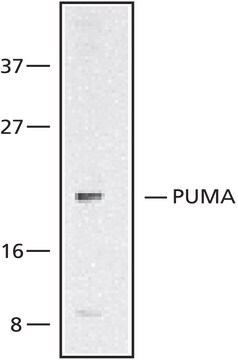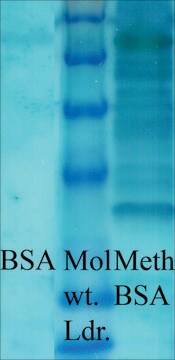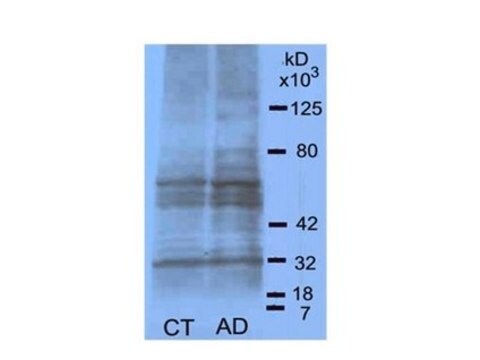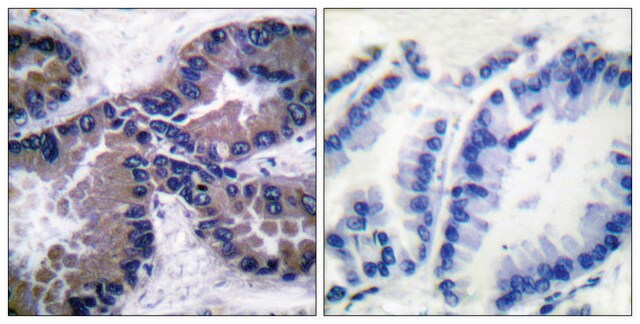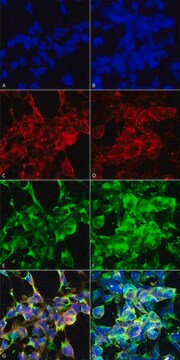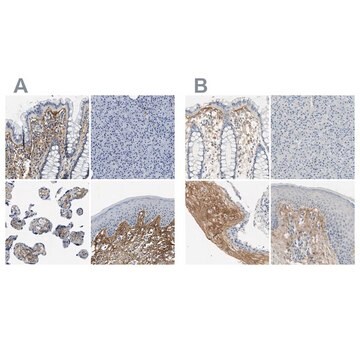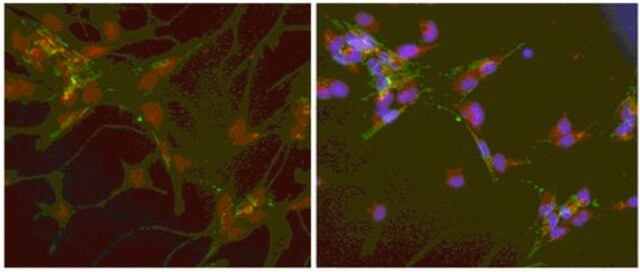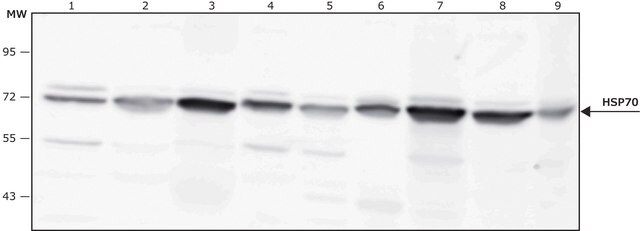추천 제품
생물학적 소스
mouse
Quality Level
항체 형태
purified immunoglobulin
항체 생산 유형
primary antibodies
클론
6C7, monoclonal
종 반응성
mouse
종 반응성(상동성에 의해 예측)
rat, human
기술
immunohistochemistry: suitable (paraffin)
동형
IgG2aκ
배송 상태
ambient
타겟 번역 후 변형
unmodified
일반 설명
Chronic accumulation of Advanced Glycation End products (AGEs) is a common feature during aging, hyperlipidemia, and diabetes and affects function of proteins, lipids, and DNA. Although formation of AGE products is considered to be predominantly an endogenous process, certain external factors, such as some dietary products and smoking can increase the level of AGE in tissues. Under certain conditions glucose may form covalent adducts with the plasma proteins through the process of glycation. Glycation is a non-enzymatic reaction of reducing carbohydrates with lysine side chains and N-terminal amino groups of proteins. The term AGE often refers to non-reactive terminal products, such as N- carboxymethyllysine (CML) as well as reactive precursors, such as methylglyoxal (MG). CML is an AGE product that is usually found on proteins and lipids as a result of oxidative stress and chemical glycation. Excessive glycation can disrupt protein function by altering enzyme activity, receptor function, and molecular conformation. Protein glycation and subsequent formation of AGE products contributes to the pathogenesis of diabetes-related complications, such as retinopathy, nephropathy, and neuropathy. Higher levels of CML have been linked to greater hip fracture risk in older adults, independent of bone mineral density. AGE products interact with a variety of cell-surface AGE-binding receptors (RAGE) that results in their endocytosis and degradation. It can also generate pro-oxidant and pro-inflammatory events in cells. AGE products could also contribute to the development or worsening of many degenerative diseases, including Alzheimer′s disease. (Ref.: Cai, W., et al. (2002). Mol. Med 8 (7): 337-346; Barzilay, JI et al (2014). J. Bone Miner. Res. 29(5):1061-1066).
특이성
Clone 6C7 specifically reacts with carboxymethyl lysine modified proteins.
면역원
Carboxymethyl Lysine modified Keyhole Limpet Hemocyanin (KLH).
애플리케이션
Anti-AGE, Carboxy-Methyl Lysine, clone 6C7, Cat. No. MABN1837, is a highly specific mouse monoclonal antibody, that targets Carboxy-Methyl Lysine (CML) modified proteins and has been tested in Immunohistochemistry (Paraffin).
Research Category
Neuroscience
Neuroscience
품질
Evaluated by Immunohistochemistry in mouse kidney tissue.
Immunohistochemistry Analysis: A 1:50 dilution of this antibody detected AGE, Carboxy-Methyl Lysine in kidney tissue of mice fed high AGE diets.
Immunohistochemistry Analysis: A 1:50 dilution of this antibody detected AGE, Carboxy-Methyl Lysine in kidney tissue of mice fed high AGE diets.
물리적 형태
Format: Purified
Protein G purified
Purified mouse monoclonal antibody IgG2a in buffer containing 0.1 M Tris-Glycine (pH 7.4), 150 mM NaCl with 0.05% sodium azide.
저장 및 안정성
Stable for 1 year at 2-8°C from date of receipt.
기타 정보
Concentration: Please refer to lot specific datasheet.
면책조항
Unless otherwise stated in our catalog or other company documentation accompanying the product(s), our products are intended for research use only and are not to be used for any other purpose, which includes but is not limited to, unauthorized commercial uses, in vitro diagnostic uses, ex vivo or in vivo therapeutic uses or any type of consumption or application to humans or animals.
적합한 제품을 찾을 수 없으신가요?
당사의 제품 선택기 도구.을(를) 시도해 보세요.
Storage Class Code
12 - Non Combustible Liquids
WGK
WGK 1
Flash Point (°F)
Not applicable
Flash Point (°C)
Not applicable
시험 성적서(COA)
제품의 로트/배치 번호를 입력하여 시험 성적서(COA)을 검색하십시오. 로트 및 배치 번호는 제품 라벨에 있는 ‘로트’ 또는 ‘배치’라는 용어 뒤에서 찾을 수 있습니다.
자사의 과학자팀은 생명 과학, 재료 과학, 화학 합성, 크로마토그래피, 분석 및 기타 많은 영역을 포함한 모든 과학 분야에 경험이 있습니다..
고객지원팀으로 연락바랍니다.